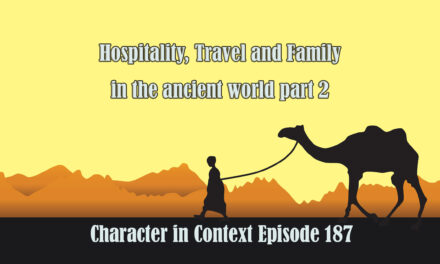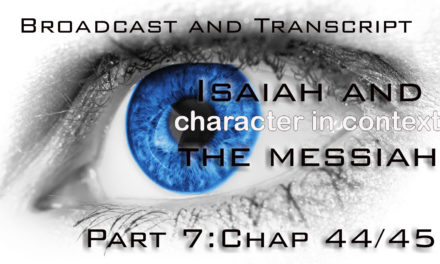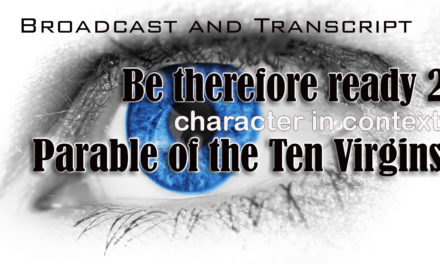What is inerrancy? Depends on who you ask. And yet, with so many definitions and no absolute agreement even on the basics, people sure do a lot of fighting about it. It’s a word that means different things to different people and so, based on what we have covered so far in the study series, what can we believe about the Bible? And does the Bible claim to be inerrant, or something else entirely?
(My affiliate links for Amazon products included in the post. As an Amazon Associate, I earn from qualifying purchases.)
I am now webcamming the recording process, which results in a slightly longer version of the teaching with a bit more nonsense than the radio show sometimes. You can catch that here.
If you can’t see the podcast player, click here.
Hi, I am Tyler Dawn Rosenquist, and welcome to Character in Context, where I usually teach the historical and ancient sociological context of Scripture with an eye to developing the character of the Messiah. But not right now, right now I am doing a series about how to not waste your time with bad study practices, bad resources, and just the general confusion that I faced when I started studying the Bible and was trying to figure out what to do and whose books I should read. Bottom line, I read a lot of nonsense and spent a ton of money on it. I am going to give you some basics on how to avoid a lot of the pitfalls, save money, maximize your time and effort, and get the most out of what you are doing. The master book list can be found here, and I will add to it as needed.
If you think that anything about inerrancy, inspiration, and authority is cut and dried or easy to understand—you have been incredibly mislead and have likely only listened to one person who made it sound like they were the only one who has it right. But there is nothing easy about the topic of inerrancy. If your only exposure to it is through the Chicago Statement on Biblical Inerrancy that was put together in 1978 during the “International” Council on Biblical Inerrancy, then you might not be clear on what inerrancy has meant, historically, to various people or for that matter, clear on an International Council needing to be more than a group of American white men having a meeting in Chicago. As an American, can I just say how ridiculous we are that whatever we do here, we consider to be the world whatever or international whatever. Like, for example, the World Champions in Football and Baseball are either going to be American or Canadian teams? Whereas the soccer world cup truly is a world competition. Well, the same thing happens in religion with Americans (and, to a lesser extent, Europeans in general) tending to think that we are the whole shebang when we aren’t. The conclusions we come to and the understandings we attempt to assert as normative generally do not reflect what the rest of the world (which makes up the majority of the church) is thinking, saying, doing, and believing. And so, far from being worldwide agreed-upon principles, our ideas are often parochial (meaning very narrow in applying only to us and our specific denomination) instead. This is why I strongly encourage people to read theology and scholarship, anthropology, and ethics from African, Asian, and South American sources and not just European. The people who are actually in the trenches have a lot to teach us about the Bible, things that we have lost sight of as we go through our lives of relative religious ease.
To prepare for this, I read a terrific book called Five Views on Biblical Inerrancy from the Counterpoints: Bible and Theology series (affiliate links), which does just a terrific job of showing that educated, intelligent, dedicated scholars and theologians can look at the same texts and see things differently. On Kindle, these books are so reasonably priced even when not on sale that it is hard not buying them all. Honestly, I believe that if people were more familiar with the idea that we can have differences and no one has a corner on correct interpretation, a lot fewer people would be drawn into cults where there is always just “one true way” of seeing and living everything out. The truth is the better we know the Bible, the more questions we have and not fewer. It is very easy to believe we know it all when we, in fact, don’t know enough to challenge that assumption. One thing that I really hope I have instilled in you throughout this series is how incredibly beautiful, nuanced, and complex the Bible is while still being very clear on how allegiance to Yeshua/Jesus is the path to salvation from this present evil age. God wanted that part to be easy—the rest of it, we have to work for!
There are a number of different ideas about, for, and against certain forms of inerrancy doctrine, but before I get to that, I want to make sure you know that the Bible nowhere outright or clearly claims to be inerrant, which means “without any sort of error.” Inerrancy is what is called a secondary issue because salvation doesn’t hinge upon accepting it, and furthermore, it has to be argued based on our interpretation of verses that talk about truth and honesty—which would have been seen differently by the original audience. For example, I can tell you a story with an error in it and still be telling you the truth. Allegories, parables, metaphors, poetry, and wisdom sayings all tell the truth, but they do it by not being accurate. Some of the early church fathers saw the Bible as “inerrant,” but their definition of inerrancy included the idea that they could treat the Bible as one big allegory where everything could be spiritualized and not everything was historical truth. Modern-day fundamentalists are often guilty of promoting a form of inerrancy where the Bible tells us the absolute, accurate truth about everything—including science, and if you don’t think that is a problem, then you have never seen a congregation torn apart by how old the earth is, how God created the earth, the shape of the earth, or whether we think with our brains or internal organs. Most people, however, fall in between those two extremes. And outside of America, inerrancy isn’t really something that is focused on or talked about. Instead, they focus more on the infallibility of Scripture to accomplish its goals of revealing Yahweh and His plan of salvation to humanity. The closer a society is to the concept of oral culture and storytelling as truth-telling, in opposition to the modern American focus on accuracy, facts, and the desire for things that can be empirically proven (like science and modern history books), the less likely they are to get upset about everything having to be “just so.”
A lot of the inerrancy debates come down to a person’s beliefs in the matter of whether we are supposed to primarily be relational beings with God and one another, guided by the Spirit who uses the Scriptures to accomplish a lot of that guidance, or whether we are people who are to relate primarily to the Bible as an intermediary between ourselves, other humans and God. Have we been taught God as the main focus or do we see the Bible to be our main focus? If we had no more Bibles, would we even see ourselves in relationship with God? Is He big enough to communicate with us if we aren’t literate and are without the Bible—as have been the overwhelming majority of believers until just the last few hundred years. Are we people seeking to be led by the Spirit, or do we want to use the Bible to answer all of our questions, even questions it was never meant to answer?
Most people I have come across who claim the absolute inerrancy of the Scriptures believe that we have an absolutely perfect transmission on both the Hebrew and the Greek throughout the millennia when we absolutely do not. Our oldest links to the Hebrew Bible are actually almost entirely in Greek, via the Septuagint, or sectarian documents such as were found among the Dead Sea Scrolls. Both of these sources predate our oldest full Hebrew manuscripts of the Bible by approximately a thousand years, and there are significant differences between them. It becomes apparent in reading them that the ancients weren’t really that concerned with the individual words or claims but with the overall meaning. And we also have the testimony of the Greek Scriptures where the authors weren’t particularly preoccupied with the importance of exact quotations but were content to convey the meaning and to even creatively combine verses. And if anyone ever took the Scriptures seriously, it was the Jewish scholars who provided those first Greek translations of the OT, the Qumran community who believed very strongly that everyone else had it all wrong, and the disciples of Yeshua. For that matter, Yeshua didn’t always give pretty quotations either. And, during those days, they actually read Aramaic paraphrases of the Bible, complete with some very interesting and sometimes sketchy commentary, in the synagogues after the reading of the Hebrew.
Augustine, who argued for an allegorical reading of the Bible, had interesting ideas about what constitutes inerrancy, which I am quoting from that Five Views book, Love is fundamental to truth. Hence, the prominent early church theologian Augustine of Hippo asserts that if we read Scripture in ways that lead us to love, we read it truthfully. Likewise, if we read it in ways that do not lead us to love, then we misread it, no matter what else we affirm that it teaches. (Zondervan. Five Views on Biblical Inerrancy (Counterpoints: Bible and Theology) (p. 274). Zondervan Academic. Kindle Edition.) You gotta love that and if people would only do that, nobody would be arguing today that slavery is okay (like John MacArthur), or that women should submit to polygyny, or any number of things that the Bible, in its historical context, sometimes allowed but never claimed were either holy or loving.
Now, I will say that the Chicago statement, when read properly, does at least try to hedge its claims that the Bible is completely without error. They, for one, claim that the original autographs were without error. An autograph is an original document, whereas a manuscript is a copy of either the original or another copy. But such claims are empty because no such documents exist! And if they did, what do we do about the obvious edits? When the Bible says something like, “and this monument still exists to this day,” obviously, that note was written a long time after the initial events. Moses didn’t record the details of his trip to the mountain to overlook the Land of Canaan and his death. Nor did Moses write about the land of Dan when it didn’t exist yet. And that’s perfectly okay because stories change as context is gained or lost. Who knows what was originally called the territory of Dan?—whoever edited it did the audience a favor. And that happens a lot. It needs to happen for meaning to be retained. So, calling the autographs inerrant is a logical fallacy called an a priori argument–it is based upon a belief that cannot possibly be proven to be true no matter how hard anyone tries! Like when people claim that when we are babies, we can see God and hear Him; okay, that’s nice, but it assumes a lot of things that don’t make any difference when we are adults! It’s a non-issue in real life and nothing that can be proven.
The Chicago Statement also makes sure that its claims of inerrancy are linked to what was written within its original context—literary, historical, sociological, etc. And that definitely helps, but very few people are well educated in those things–very few church pastors and even fewer laypeople. When these claims trickle down to people who truly haven’t ever even been introduced to the idea that context is even something that can be known, we instead get into arguments about the Bible needing to be scientifically accurate, especially when one of the claims of the Statement is that we cannot overturn anything that the Bible says about Creation or the Flood or the falling of the walls of Jericho with anything that comes from either science or archaeology. And yet, the majority (probably the overwhelming majority) of OT scholars and theologians today recognize, not because of science but because of Biblically based archaeology, that the original audience of Scriptures would have never looked at Gen 1 or 2 and seen stories about the material creation of the universe. Even Yeshua, in His rephrasing of the two greatest commandments, used his audience’s modern scientific knowledge to change the importance of loving God with “heart, soul, and strength” to loving God with “heart, mind, soul, and strength” because they had figured out about five hundred years earlier that brains actually weren’t useless skull wadding.
I can’t offer you any easy answers about how the Bible works as far as being inerrant or infallible, but let’s talk for a bit about the Bible being authoritative, which almost everyone agrees on. A lot of times, this verse is used to attempt to prove inerrancy, but that isn’t what the verse is claiming: “But as for you, continue in what you have learned and firmly believed. You know those who taught you, and you know that from infancy, you have known the sacred Scriptures, which are able to give you wisdom for salvation through faith in Christ Jesus. All Scripture is inspired by God and is profitable for teaching, for rebuking, for correcting, for training in righteousness, so that the man of God may be complete, equipped for every good work[1]” (2 Tim 3:14-17, CSB)
And let’s look at it in my favorite new Bible, The Second Testament: A New Translation (affiliate link), written to better reflect the Greek, by Scott McKnight “but you remain in the matters in which you were apprenticed and have been committed to, knowing from whom you were apprenticed, and that from infancy you have known the sacred writings, the matters able to wisen you to deliverance through allegiance that is in Christos Yēsous. Every Scripture is God-spirited and useful for teaching, for convicting, for straightening out, for education that is in rightness, so God’s human may be fit, outfitted for every good work. [2]
Of course, these verses are referring to the usefulness and profitableness of inspiration of Scripture and not any sort of word for word perfection; we can clearly see that they never used it that way either—not in the OT, which is referred to here, or in the NT which quotes very liberally from the OT. And if we look at the Talmud or other extra-biblical Jewish writings, they weren’t any more fussy about precision than the Jews who wrote the NT. Pre-enlightenment thinkers were very different than we are today, and oftentimes our ideas about inerrancy are a reflection of modern and even worldy thought as opposed to how the ancient world thought or any sort of “Hebraic” mode of thinking.
Why does the author of Timothy speak of the OT this way? Because the Scriptures were meant, first and foremost, to lay out God’s covenantal salvation plan and to impart wisdom. Gen 1-11 are about the problem, and Gen 12 (plus everything that comes after) is about the solution. And I would agree that the Scriptures are flawless in laying those out for us, as long as we are very mindful of the original context—which involved a very flawed society (ancient Israel) which itself sat in the middle of an even more flawed worldview that shaped the way everyone looked at life and accepted as normal. Scripture elevates God and not any particular culture within any time period. Scripture, teaching wisdom, stands as a constant critic of how we live and believe. It never says, “Okay, you’re good now—stop where you are. Congratulations, you are Torah Observant, and I have no more to teach you.” On the contrary, Scripture tells us to keep pressing forward, beyond the bare and basic principles of the Siniatic Covenant, toward the perfection of loving both God and neighbor, and love does no harm. If we stop reading at the end of Deuteronomy, do we have an inerrant and flawless exposition of all God has to speak to us? Of course not. Only the Samaritans ever believed that, and maybe the Sadducees as well. The prophets and the Proverbs call us to higher standards than the Torah, much higher standards. And Yeshua goes exponentially farther than anything we find before Him.
You see, this is where the idea of inspirational infallibility appeals to me, personally, more than inerrancy. Inerrancy is an idea which cannot be absolutely proven. It is a belief. But because the Bible clearly states that it is an inspired collection of writings by different human authors who lived in wildly different times and circumstances, we can use that (inspiration) as a starting point, and that is where we can call the Bible authoritative. It absolutely has a proven track record, when taken as a whole and not abused, of guiding us toward righteousness and salvation within the context of covenant relations. And it leads to a relationship with God and not with a translation, despite a lot of people going there and believing that this or that version or even the Hebrew and Greek absolutely reflect original writings when we have loads of evidence to the contrary. But is Scripture useful? Yes. Does the Spirit use it in our lives to impart wisdom? Yes. Does the entire Bible, front to back, lead us to salvation in Yeshua? Yes, absolutely. Do we need to be taught from the Scriptures? No question about it. Has God used them to correct and rebuke us as we read and hear? That’s pretty much all that seems to happen when I read them! Does the Bible, historically, have a consistent reputation for changing people, societies, and cultures for the better when it is available to the public and not just the elites. Yes. Yes. Yes. Only an inspired book can do that and retain that authority over thousands of years to radically change the world into a more loving and just place, which we even see within secular culture. As a matter of fact, the effect that the Bible has had on secular culture should challenge us in some of the areas where they are not only gaining on us but have surpassed us. I am talking about Creation care and creature care, specifically. They don’t have their eyes set on rapture or destruction, and so they are focused on wisely caring for the world as though people will be living here forever. And according to the end of the Bible, they are right.
How does inspiration work? Good question. One thing is for certain, there are no possessed robots involved. If we can see one thing over the expanse of the Biblical record, it is that different writers have entirely different writing styles. If the people were completely taken over and the Bible forced word by word through them, we wouldn’t see any individuality. We wouldn’t be able to say that we really don’t think Paul wrote Hebrews based upon word choice. But what we can clearly see (or at least argue), is that they were impressed with truths and ideas which came through them in certain distinctive ways. They told the truth with what language they had available to them, as well as common cultural understandings and ideas. They used metaphors and idioms and their understanding of how the universe worked and whether or not there were or were not other gods in the world. They wrote with a focus on men because society was focused on males, while still showing a shocking level of egalitarian ideology compared to the rest of the world. The Bible is truly a remarkable document that I believe leads us from sin and death into life in Christ. I spend every day in the Bible in one way or another. Every night, David Suchet reads the Psalms to me (affiliate link) as I unwind from the day and prepare to fall asleep.
But if the Bible was all I had, I wouldn’t still be here because it would just be a book. Without the real working of God in my life, which I cherish above and beyond the written word, I would have no reason to teach the Bible or to preach it or to even believe it. Because the Bible is inspired and infallible in that regard, that it is used by the Spirit effectively to guide me (although the Spirit is not limited to the Bible in that job), I don’t need everything to be scientifically accurate or to be following the rules of modern historical books. My God is so big, faithful, and trustworthy that He is the focus, and the Bible is helpful and useful but not on the same level as being divine. That’s just me, you may feel differently. Really, what I believe is more informed by having been taught by theologians and scholars from other cultures than from the American “Battle for the Bible.” But what I believe is also shaped by my personal relationship and the path I have walked. It doesn’t mean that you or your path or your view of the Scriptures is wrong. God once told me never to be separated from anyone on the basis of anything except Christ and Him crucified. All this other stuff? We divide over it based upon vanity, most often.
[1] Christian Standard Bible (2 Ti 3:14–17). (2020). Holman Bible Publishers.
2 McKnight, S. (2023). The Second Testament: A New Translation (2 Ti 3:14–17). IVP Academic: An Imprint of InterVarsity Press.





















